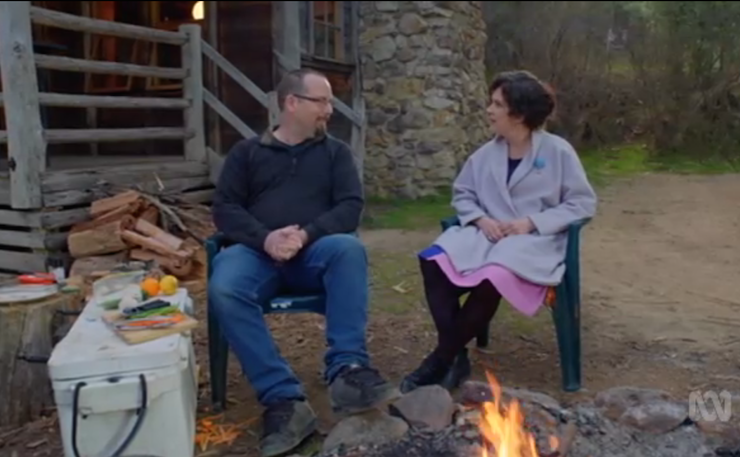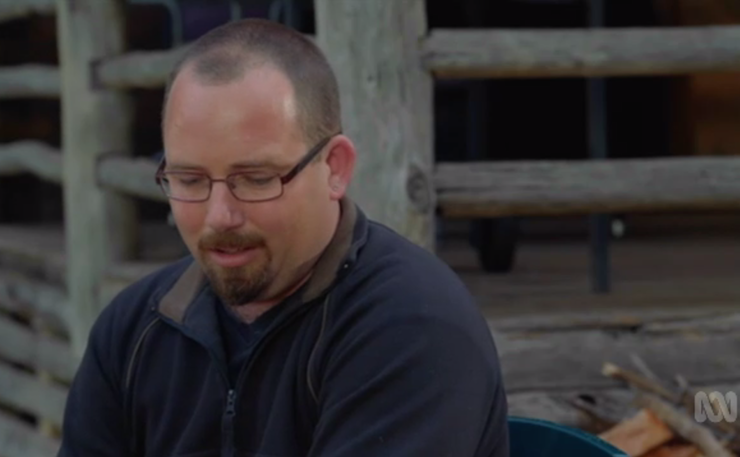Muir’s transformation in the limelight shows the benefit of a more earnest approach to the media, writes former staffer Peter Breen.
Early last week I was trying to anticipate the questions and how best to answer them. A television journalist from the 7:30 Report had foreshadowed a trip to the north coast for a story about renewable energy. Perhaps the journalist wanted to talk about the Paris climate conference next month. Yes, a maximum temperature rise of 2 degrees Celsius is the ballpark if we want to avoid the worst effects of climate change. But at 1.5 degrees C, I might say, there is no Great Barrier Reef and no Kakadu wetlands according to the latest science from the Climate Council. Do the news makers want the good news or the bad? Am I to be the villain or a hero? Current affairs programs tend to set their own agendas.
Politicians of all stripes get nervous about talking to television journalists. Who could forget former Prime Minister Tony Abbott’s frozen moment lasting 28 painful seconds during a Seven News interview with television journalist Mark Riley? A few years ago I had an amiable chat off camera with another television journalist about my representations on behalf of two juveniles who had been sentenced to life in prison by the New South Wales Parliament. The sentences were outrageous, I said, a gross misuse of legislative and executive power over the judicial power.
And the journalist seemed to agree with me, or so I thought. As soon as the cameras started to roll, I became the devil incarnate with no apparent concern for the victims of crime and their families. I was lost for words. Some years later I was able to sympathise with Senator-elect Ricky Muir similarly stranded in a television interview with veteran journalist Mike Willesee. In fact, Muir offered me a job as a policy adviser – a position which I gratefully accepted – in his Canberra office on the day his notorious interview with Willesee was broadcast.

Two weeks ago Senator Muir made a spectacular recovery from his television baptism of fire with a terrific interview on Kitchen Cabinet hosted by Annabel Crabb. Nobody could dislike a politician without guile who is so obviously a person of integrity and completely besotted by his family. His inexperience may make him vulnerable – and Crabb might have had him on toast – but the occasion called for a hero not a villain. An early program promo from ABC Television described Muir as “the people’s senator” although it may have been seen as a partisan label in some dusty corner of the ABC. The idea that a senator might represent the people disappeared from view after a short airing. By the time of the broadcast Muir was the accidental senator – the people’s longshot. A Michelle Payne for political punters who can talk under wet cement if given the chance.
In June last year, a few days before heading off to Canberra to start the new job, I was watching the television news when Clive Palmer suddenly appeared on screen to inform viewers about what he promised would be “an announcement to give hope to mankind.” It was an extraordinary promise to make by any measure. The next day, I was shocked to see news reports of Palmer standing beside Al Gore in the Great Hall of Parliament House – the first press conference in the great space. While confirming his decision to support the Abbott Coalition government’s plan to scrap the carbon tax, Palmer wanted to reassure voters that they would receive the full measure of the savings as reductions to their electricity bills. This was a tall order given the carbon tax had brought in about $16 billion in gross revenue in its short life.
Personally, I was shocked by the Coalition’s decision to abolish the carbon tax. Nobody can do anything serious about climate change without putting a price on carbon. But I had to acknowledge that political pugilist Abbott had a mandate to go down the abolition track. What I did not concede was the Coalition government’s undisclosed plan to take us back to square one on climate change policy. Abbott wanted to get rid of the supporting infrastructure of the carbon tax which monitored and assisted industry to manage climate change.
The Renewable Energy Target – an initiative of the Howard Coalition government – together with the Climate Change Authority, the Clean Energy Finance Corporation and the Australian Renewable Energy Agency were all positive green environmental initiatives that featured strongly in the former Gillard Labor government’s Clean Energy Act 2011. Clive Palmer correctly argued that scrapping the carbon tax did not include a mandate to dismantle the important renewable energy policies of previous Liberal Coalition and Labor governments.
I spoke with Don Henry, the former head of the Australian Conservation Foundation and professor of public policy at Melbourne University, to get some background on why Al Gore would want to be seen on the same stage with one of the country’s mining magnates. Henry said he was a member of Al Gore’s international board and in that capacity the former United States vice president had asked him if there was any chance of a private meeting about climate change with an Australian politician. When Henry approached Palmer about a possible meeting, he did not expect Palmer to agree. Not only did he agree to the meeting with Gore, but Palmer suggested a public meeting in the form of a news conference in the Great Hall.
Most surprising of all Palmer’s public statements in support of the natural environment during his press conference with Al Gore was the commitment to do what he could to retain the Climate Change Authority and the Clean Energy Finance Corporation, as well as protect the Renewable Energy Target. It was one thing for a mining magnate to be sympathetic to these initiatives in private, but quite another to advocate for them on a public stage with perhaps the world’s most conspicuous environmentalist. Palmer seemed to have moved at breakneck speed from denier to sceptic to supporter of the scientific evidence that human activity is changing the natural environment. Newspaper pictures of Palmer and Gore standing shoulder to shoulder depict Palmer as the cat with the cream.
Shortly after his election to the Senate, Ricky Muir made the decision to work in a loose alliance with Clive Palmer and the three newly elected Palmer United Party (PUP) crossbench senators: Glenn Lazarus from Queensland; Jacqui Lambie from Tasmania and Dio Wang from Western Australia. Between them, the three PUP senators and Muir had the power to block any legislation in the Senate if they voted with the Greens and the Labor Party. When numbers were being counted in advance of a vote on the carbon tax abolition bills, Muir wanted to know why the Palmer United Party had agreed to save the Climate Change Authority and the Clean Energy Finance Corporation but not the Australian Renewable Energy Agency. Surely the research and development arm of the clean energy legislation was no less important than the governance or the finance arms.
Palmer seemed happy enough for Muir to make the running on saving the ARENA saying the PUP senators could not do everything. Muir approached parliamentary counsel for an amendment to exclude ARENA from the carbon tax abolition bills. The Greens had a similar amendment but struggled to get crossbench support for their proposal which included leaving ARENA with $1 billion in the bank. Muir was getting support from senators who liked the idea of allowing the government access to ARENA’s bank account to help with the budget shortfall while leaving the agency intact. When it looked like Muir had the numbers for his amendment without the PUP senators, Palmer blew up saying he had not agreed with the government to save ARENA. He said he was going to the press to end the alliance with Muir. Muir stood firm, as he does, and Palmer blinked. Palmer issued a press release saying PUP senators now agreed to plans to re-schedule ARENA’s funding following extensive discussions with Senator Muir.
In his first speech to the Senate delivered with all the confidence in the world, Senator Muir said that saving ARENA in his first weeks in the new job was a big moment and “if I never achieve anything else I could still be proud of that.” He can also be proud of his recovery from the Willesee interview. You just have to relax and be yourself he told Annabel Crabb. I will be taking a leaf out of Muir’s book when eventually I face up to the 7:30 Report.
At the moment the interview has been postponed due to the intervening trouble in Paris. I hope the television program is looking for heroes, ordinary people in the community worried that the government is taking us to hell in a hand-cart on climate change. In a report three weeks ago from the CSIRO, a survey of almost 18,000 people over five years showed 78 per cent of Australians believe in climate change, but only 28 per cent of Liberal supporters and 22 per cent of Nationals voters believe climate change is caused by human activity. Now that’s something to worry about.
Donate To New Matilda
New Matilda is a small, independent media outlet. We survive through reader contributions, and never losing a lawsuit. If you got something from this article, giving something back helps us to continue speaking truth to power. Every little bit counts.





